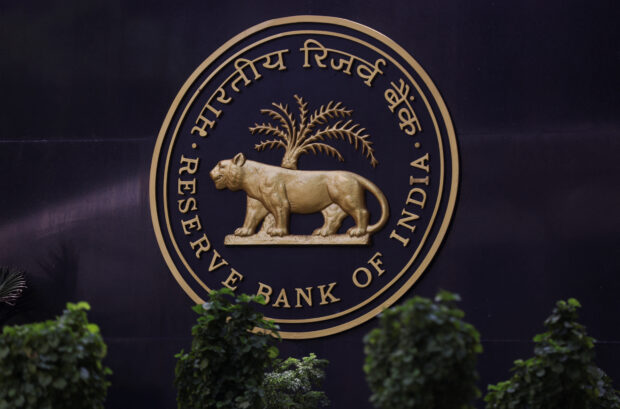India’s central bank holds interest rates as inflation risks linger

A Reserve Bank of India (RBI) logo is seen inside its headquarters in Mumbai, India, April 6, 2023. REUTERS/Francis Mascarenhas
MUMBAI — India’s central bank kept interest rates unchanged for the seventh time in a row on Friday, with the world’s fifth-largest economy seeing both lingering inflation risks and strong economic growth.
The Reserve Bank of India (RBI) said its benchmark “repo rate”, the level at which the central bank lends to commercial banks, would remain the same at 6.50 percent.
Major central banks around the world have signaled a move towards rate cuts this year.
In India, inflation has been on a downward trajectory, but is still stubbornly above the RBI’s 4 percent target.
The government has also forecast a heatwave in several parts of the country, which would threaten to send food prices spiking.
Article continues after this advertisementStrong economic growth has also reduced the urgent need for a rate cut.
Article continues after this advertisementREAD: India’s ‘Goldilocks’ economy to prompt RBI to keep rates on hold
India’s economy grew at a robust 8.4 percent in the December quarter with a surging manufacturing sector helping defy more modest analyst forecasts.
Robust growth prospects
“Looking ahead, robust growth prospects provide policy space to remain focused on inflation and ensure its descent to the target of 4 percent,” said RBI governor Shaktikanta Das.
READ: India’s March factory growth hits 16-year high, hiring picks up
But “uncertainties in food prices continue to pose challenges”, he added, so that “monetary policy must continue to be actively disinflationary”.
Interest rates were hiked by 2.5 percentage points between May 2022 and February 2023, but have stayed constant since then.
India’s retail inflation came in at 5.09 percent in February, almost unchanged on the previous month, led mainly by an increase in food prices.
The country’s “core” inflation, which excludes food and fuel costs, remained below 4 percent.
For the financial year ended March 31, experts project India to have grown between 7.5 percent to 8 percent, the fastest among all major economies.
In February, New Delhi announced a smaller-than-expected fiscal deficit for the current financial year, shunning populist spending in the last budget before national elections that start on April 19.